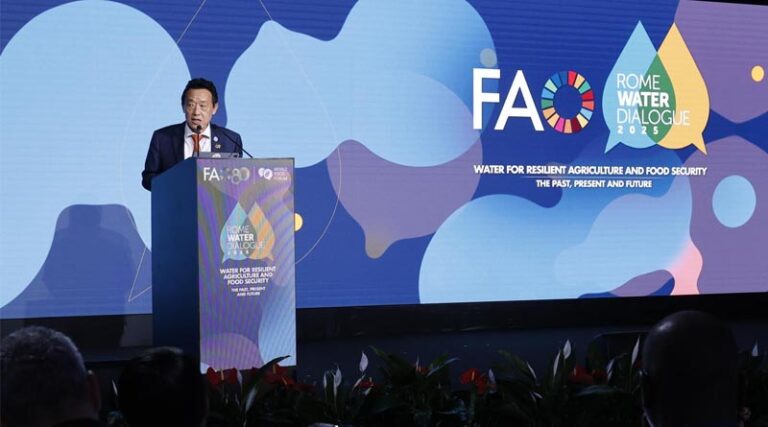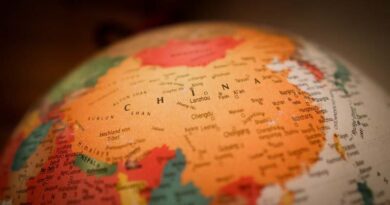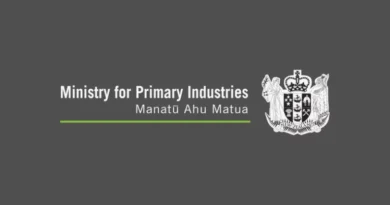
WFF 2025: Rome Water Dialogue Advocates For Concrete Solutions To The Global Water Crisis
16 October 2025, Rome: The high-level segment of the Rome Water Dialogue 2025 took place today at FAO headquarters, gathering governments, experts and communities from around the world to advance collective action on sustainable water management for resilient agriculture and food security.
The Dialogue, held in hybrid format on the sidelines of the World Food Forum under the theme “Water for resilient agriculture and food security: the past, present and future”, aimed to transform awareness into concrete action to address global water challenges across agrifood systems.
The event was structured around four main themes: water infrastructure and investment; water science and innovation; climate resilience and water-disaster risk reduction. It spotlighted water management practices that FAO Members have implemented over the last 80 years, ranging from community-level approaches to high-level strategies.
Participants also discussed recommendations to guide FAO’s future work on integrated water resource management and encouraged commitments by stakeholders across the water and agriculture sectors.
Water as a key element
In his opening remarks, FAO Director-General QU Dongyu underlined the centrality of water to FAO’s mandate and to global food security, noting that “the food we eat depends on water, and agriculture alone uses more than 70 percent of global freshwater withdrawals.”
The Director-General stressed that this reliance places a special responsibility on the agriculture sector and the importance of managing this precious resource wisely and equitably.
He warned that feeding a growing global population will further intensify demands on water resources. By 2050, feeding nearly 10 billion people will require at least 50 percent more food –and potentially 30 percent more freshwater – in a world already facing scarcity and climate stress. Producing more with less water will require efficient infrastructure, reliable data and integrated approaches, Qu added.
The Director-General noted that the challenge of water scarcity cannot be tackled in silos highlighting the need for cross-sectoral policies and cross-country approaches that deliver win-win solutions. To this end, he emphasized FAO’s evolution toward a holistic approach linking science, data, and policy.
One of the Rome Water Dialogue’s main objectives, Qu explained, is to overcome fragmentation, align policies and ensure collective efforts for innovative solutions in the water–food nexus.
“This year’s edition of the Rome Water Dialogue marks a significant shift – from connecting water and agriculture, to implementing integrated solutions,” the Director-General concluded.
The event saw the participation of among others: Maria do Rosário Teixeira de Alva Sequeira Bragança, Minister of State for Social Affairs of Angola; Gilberto Correia Carvalho Silva, Minister for Agriculture and Environment of Cabo Verde; Anton Refalo, Minister for Agriculture, Fisheries and Animal Rights of Malta; Abdulrahman bin Abdulmohsen Al-Fadhli, Minister of Environment, Water and Agriculture of Saudi Arabia; Cheikh Tidiane Dieye, Minister of Hydraulics and Sanitation of Senegal; Qurbon Hakimzoda, Minister of Agriculture of Tajikistan; Ziyozoda Sulaimon Rizoi, Deputy Prime Minister, Republic of Tajikistan; Retno L.P. Marsudi, UN Secretary-General’s Special Envoy on Water.
FAO’s work on water
Since the 1950s, FAO has helped countries design and restore irrigation systems that have brought water back to farmlands and rural communities. Over time, FAO’s engagement has evolved from field projects to a comprehensive approach linking data, science, technology and policy advice.
For example, through the AQUASTAT initiative, FAO has for 30 years provided the world’s most complete global database on water resources and use.
The WaPOR portal makes satellite-based data freely available, helping farmers and planners improve irrigation efficiency in 35 countries, protecting soils and ecosystems.
Through the Global Framework on Water Scarcity in Agriculture (WASAG) and the Regional Water Scarcity Initiatives, FAO continues to foster collaboration and knowledge exchange among Members on best solutions for sustainable water use.
In 2023, the FAO Ministerial Conference endorsed Integrated Water Resource Management as a priority for the 2024–2025 biennium, underscoring the critical link between water and food and their role in achieving sustainable development. FAO has since adopted a Conceptual Framework for Integrated Land and Water Resource Management to guide its work.
FAO supports over 35 countries in developing national drought management plans and accessing drought financing; further, FAO supports 15 countries in developing their national water strategies and roadmaps to achieve all Sustainable Development Goals.
FAO is one of the lead UN agencies implementing the UN System-wide Strategy for Water and Sanitation and preparing for the 2026 UN Water Conference, with the goal of keeping agriculture at the centre of the global water agenda.
FAO and UNCCD renew the partnership to restore land and build resilience to drought
On the sidelines of the World Food Forum, FAO and the United Nations Convention to Combat Desertification (UNCCD) also renewed today the partnership to strengthen cooperation on sustainable land, soil and water management.
The Memorandum of Understanding, which was signed today by FAO Director-General QU Dongyu and UNCCD Executive Secretary Yasmine Fouad, establishes a joint framework to avoid, reduce and reverse land and soil degradation, enhance drought resilience, and promote integrated solutions linking land restoration, agrifood systems transformation and climate action.
The partnership will be implemented through a Joint FAO–UNCCD Action Plan, which mobilizes expertise across FAO network and aligns with FAO and UNCCD priorities. The Action Plan focuses on three key areas: supporting policy dialogue and capacity development to combat land degradation, building drought resilience, and promoting data-driven approaches and knowledge sharing.
Also Read: New Holland Launches New Tractor Workmaster 105 with HVAC Cabin
📢 If You’re in Agriculture, Make Sure the Right People Hear Your Story.
From product launches to strategic announcements, Global Agriculture offers unmatched visibility across international agri-business markets. Connect with us at pr@global-agriculture.com to explore editorial and advertising opportunities that reach the right audience, worldwide.






